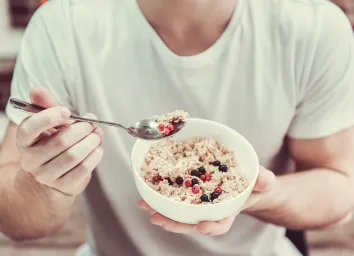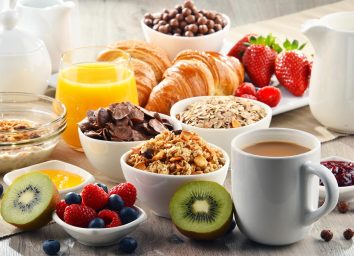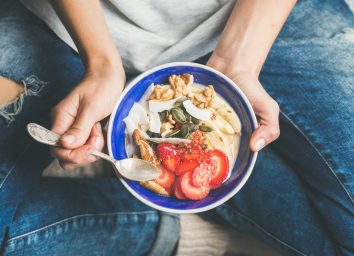The 15 Best Tips for a Healthy Breakfast, According to Dietitians
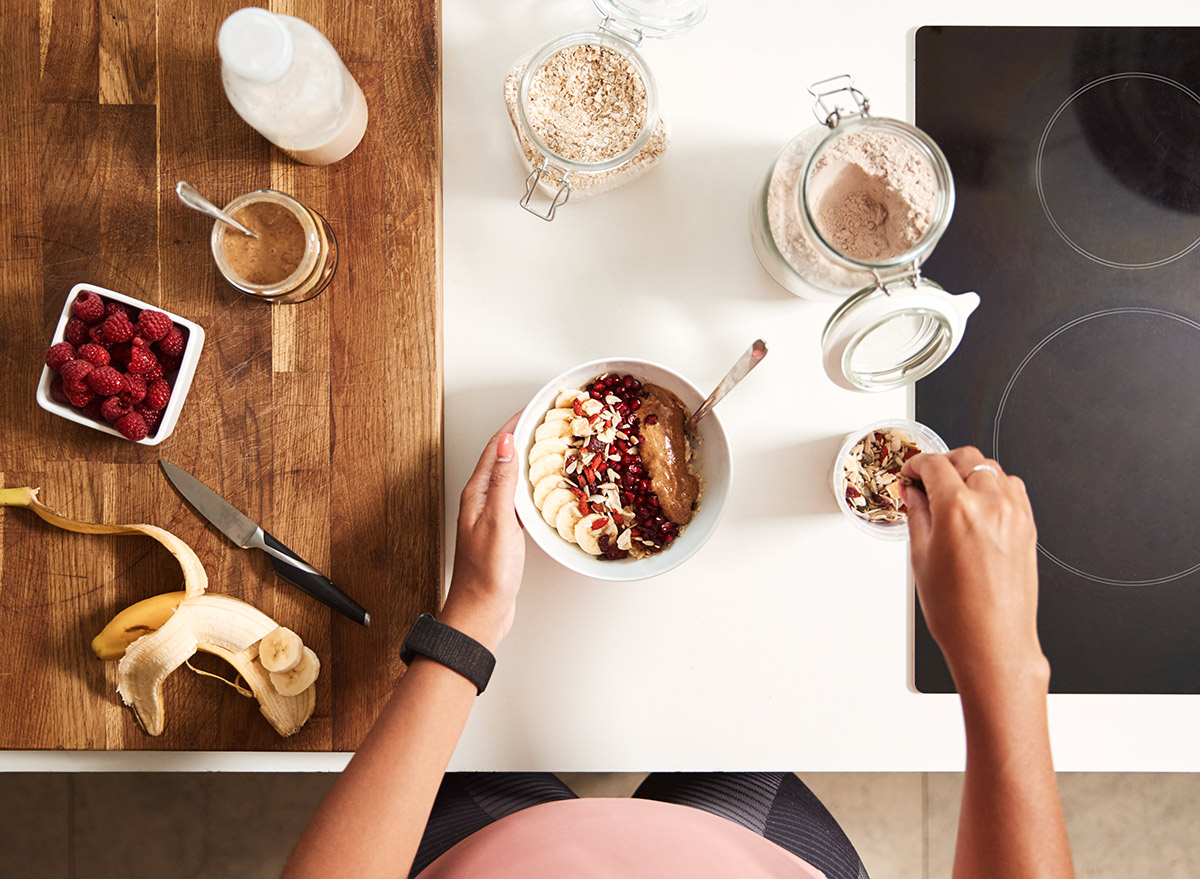
If there's one habit that dieticians and nutritionists want you to get into, it's eating a balanced breakfast. Starting your morning with a healthy meal can set you up for better choices during the rest of your day, and it can also help you to meet the daily recommendations for certain food groups and nutrients. Not to mention, studies have shown that people who eat breakfast tend to have a lower BMI than those who skip it and also tend to burn more calories throughout the day. Which is why having a few healthy breakfast tips in your back pocket is important for starting your day off right.
But before you grab a fistful of sugary cereal on your way out the door or a bacon-loaded sandwich on your commute, keep this in mind: eating breakfast is only healthy if you're choosing the right foods. In order to reap these benefits, you'll need to think about the quality of your breakfast by incorporating ingredients that are energizing, satiating, and packed with a wide variety of important nutrients.
On hectic mornings when you've hit the snooze button a few too many times, it can be tough to quickly compile a meal that's going to keep you satisfied until lunchtime. As it turns out, though, building a healthy breakfast doesn't have to take a lot of effort— just heed these expert-approved tips. Read on for healthy breakfast tips from dietitians, and for more tips, check out our list of 21 Best Healthy Cooking Hacks of All Time.
Include an antioxidant source.
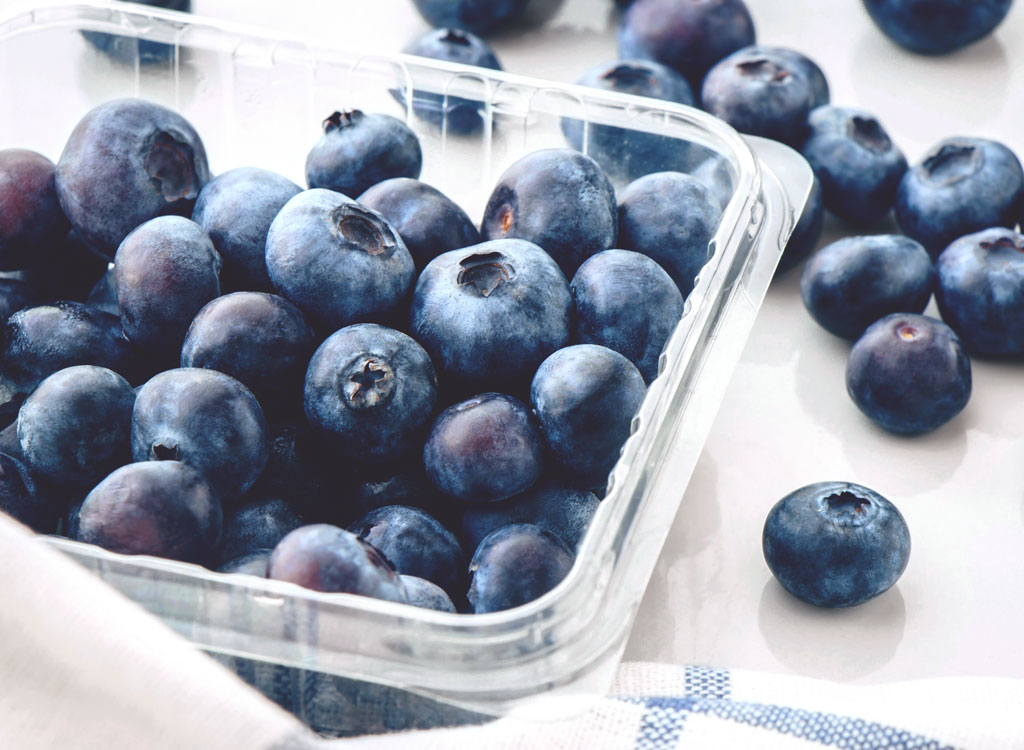
Did you know that antioxidants can defend your body from certain biochemical changes that occur as a result of stress? That's why registered dietician and nutritionist Bansari Acharya advises incorporating at least one food with antioxidants into your breakfast — especially when you have a long, intense workday ahead. It's as simple as adding blueberries to your Greek yogurt parfait or kale to your green smoothie.
Here's Why You Need Antioxidants In Your Diet—And How To Eat More Of Them.
Choose whole grains.
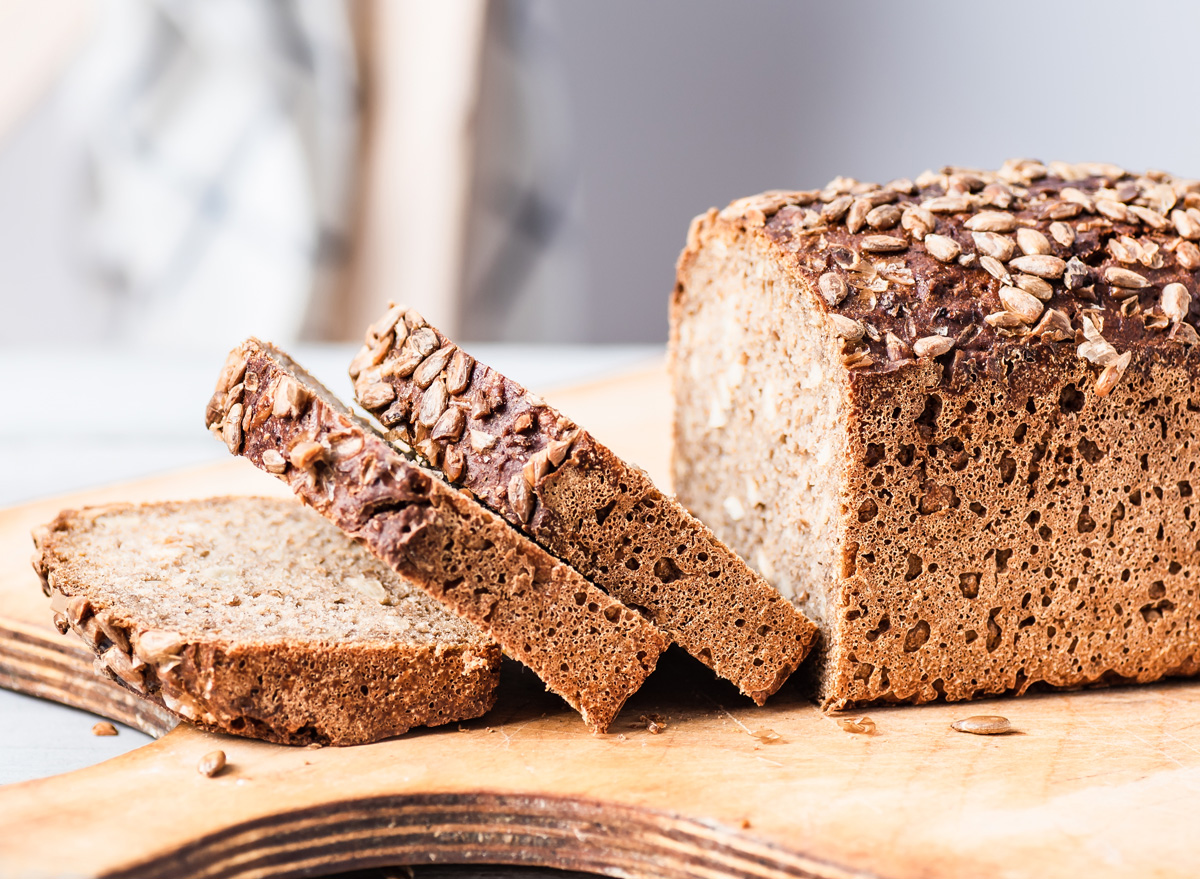
Across the board, experts agree that starting your day on the right foot nutritionally speaking means opting for whole grains over refined grains (like muffins and cereals with enriched wheat flour).
"Whole grains will increase the fiber content of your breakfast, helping keep you full for longer periods of time and stabilize your blood sugars," says Kristin Gillespie, a registered dietitian, and certified nutrition support clinician.
Corinne Kohlen, registered dietitian for Kevin's Natural Foods, also notes that fiber can keep your digestive system in optimal condition, while also helping you to maintain healthy cholesterol levels.
Remember—just because a product says "whole grain" on the packaging doesn't mean it is. Look for the official Whole Grain Stamp on the packaging, or scan the nutrition label for ingredients like whole wheat flour, brown rice, oats, spelt, flax, rye, and barley flour. Ingredients like "enriched wheat flour," "unbleached wheat flour," or "fortified wheat flour" are not considered a whole grain, and are stripped of some important nutrients in the refining process. So stay away from these 15 Worst Whole Grain Foods.
Stick to whole foods as much as possible.
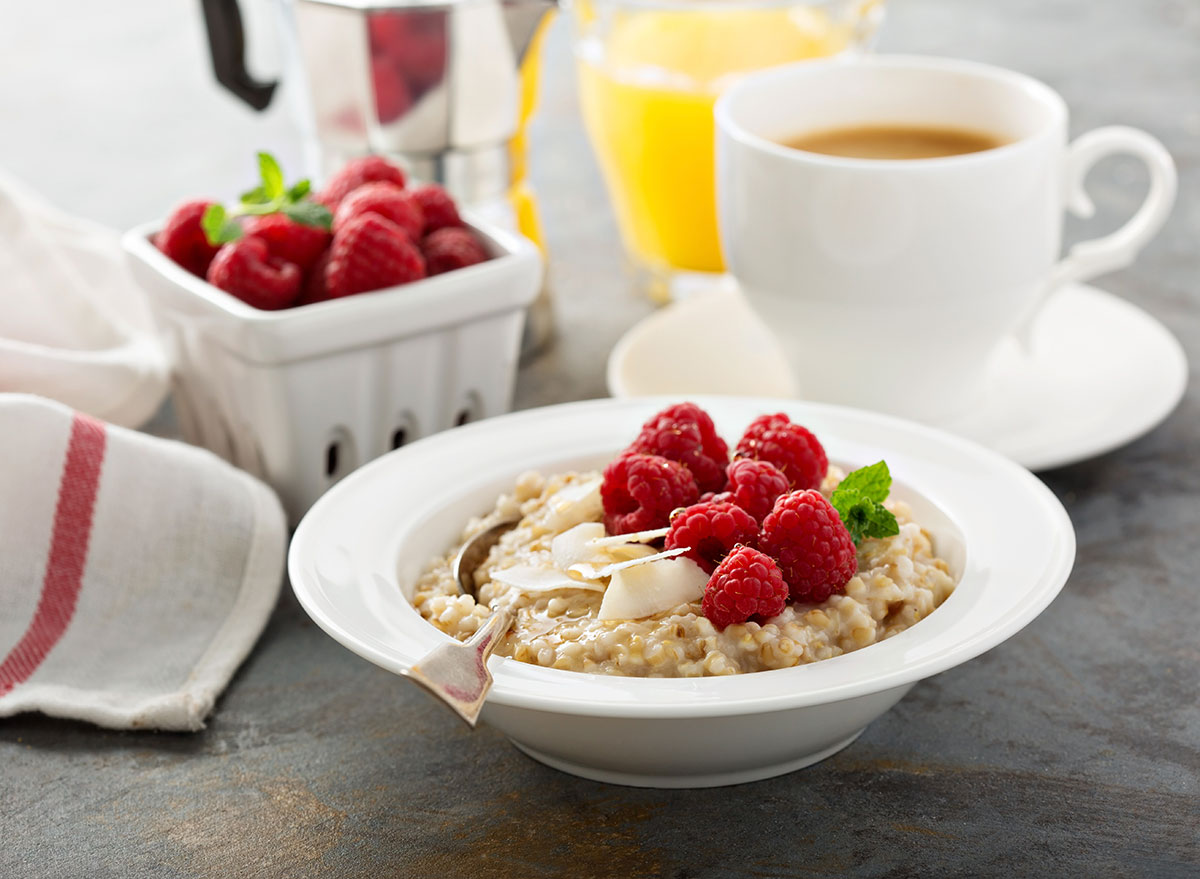
Obviously, eating a serving of strawberries is a lot healthier than a strawberry Pop-Tart. But Acharya advises taking that mindset one step further and always opting for whole foods whenever possible.
For example, a bowl of homemade steel-cut oatmeal is a better option than many boxed cereals you'll find at the grocery store, because particularly if it's not whole grain, it may not have as much fiber—which Acharya notes helps to make sure you feel fuller for longer. Not only that, but most processed cereals will have more sugar than a bowl of oats, even if you do add a drizzle of honey or agave nectar. As a general rule, the fewer ingredients a food has, the better it is for you. So, keep that in mind while you're building your breakfast.
Looking to get more fiber into your diet? Here are 20 Easy Ways to Add Fiber to Your Diet.
Keep the sweet stuff to a minimum.
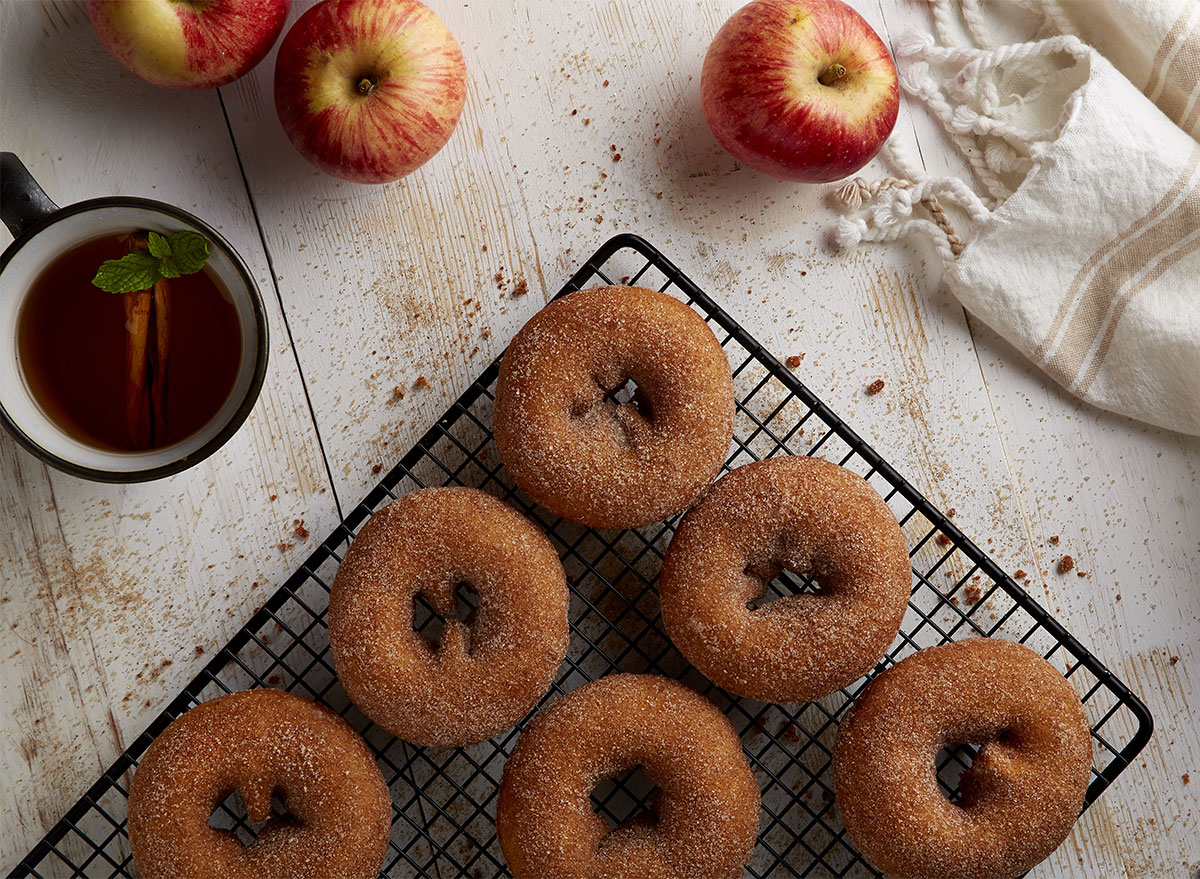
You might want to think twice before grabbing that pastry on your way to work—starting your day with a hefty dose of sugar isn't exactly going to set you up for success.
"Added sugars are empty calories, providing no vitamins or minerals and no fiber to create the feeling of fullness," says Kohlen. "While our bodies can use sugar for energy, excess sugars have no benefit and can contribute to weight gain. In fact, studies have found that people who eat sugary breakfasts have about 10% higher total daily sugar intake compared to people who chose non-sugary breakfasts."
After your blood sugar spikes and inevitably crashes, you might experience anxiety, fatigue, irritability, headaches, and even difficulty concentrating. Not exactly an ideal situation while you're trying to focus during that afternoon presentation at the office. To boot, studies have shown that when your blood sugar takes a dive, you're more likely to crave another high-carb meal, which can lead to a vicious cycle of over-eating.
"Sugar not only provides significant amounts of calories, but it also promotes dramatic blood sugar fluctuations and will leave you feeling hungry only a short time after consumption," explains Gillespie.
This is why Kohlen recommends looking at the nutrition facts on all of your breakfast foods and drinks before digging in.
"Look for products with zero grams added sugars when possible—and try to limit your total added sugars to no more than 25 grams a day for women and 36 grams a day for men," she says.
Don't forget about protein.
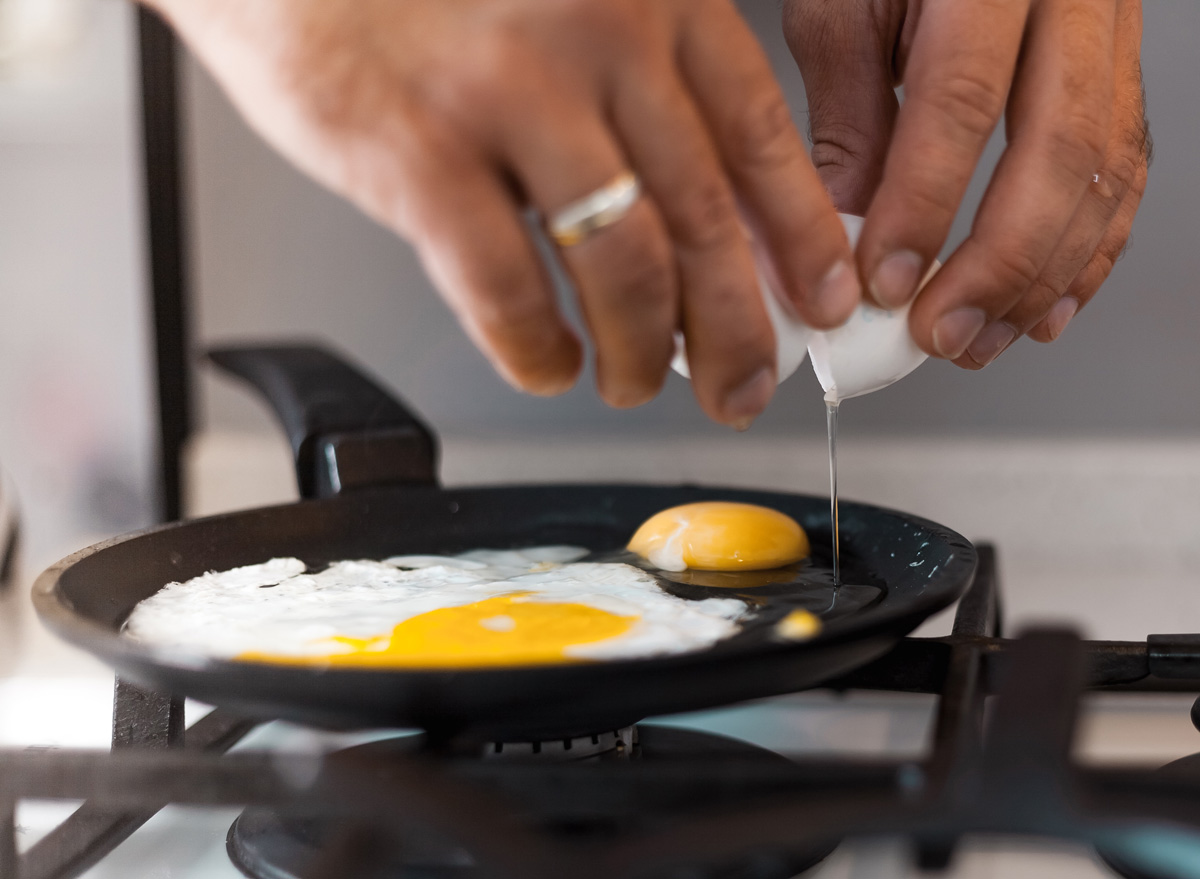
Speaking of blood sugar crashes, Gillespie says one way to avoid them is to include a protein source in your breakfast. For example, an egg with your avocado toast, cottage cheese with your fruit bowl, or almond butter to your English muffin. You can even add protein powder to oats, smoothies, homemade waffles, and pancakes to boost their staying power.
"Carbs are quick fuel, but protein can keep you full longer," explains Kohlen. "While it is totally OK to eat a high-protein breakfast without carbs, it's less ideal to eat a high-carb breakfast without protein. Additionally, eating protein first (such as eggs before fruit), may reduce blood glucose spikes compared with eating carbs first. Having a mixed meal can slow the digestive process, making your breakfast more satisfying and reducing your post-breakfast cravings."
Abbie Gellman, a chef and registered dietitian at the Institute of Culinary Education, reveals that one of her favorite protein-packed breakfasts is savory oatmeal.
"I use steel cut oats as the base and top it with sauteed veggies (whatever I have available) and a fried egg," she says. "This nutrient-rich breakfast is a great way to fuel your day. The oats add dietary fiber, iron, and plant-based protein; and an egg adds ten essential nutrients including protein, choline, and vitamins A and B12."
Here are 19 High Protein Breakfasts That Keep You Full.
Enjoy a cup of coffee.
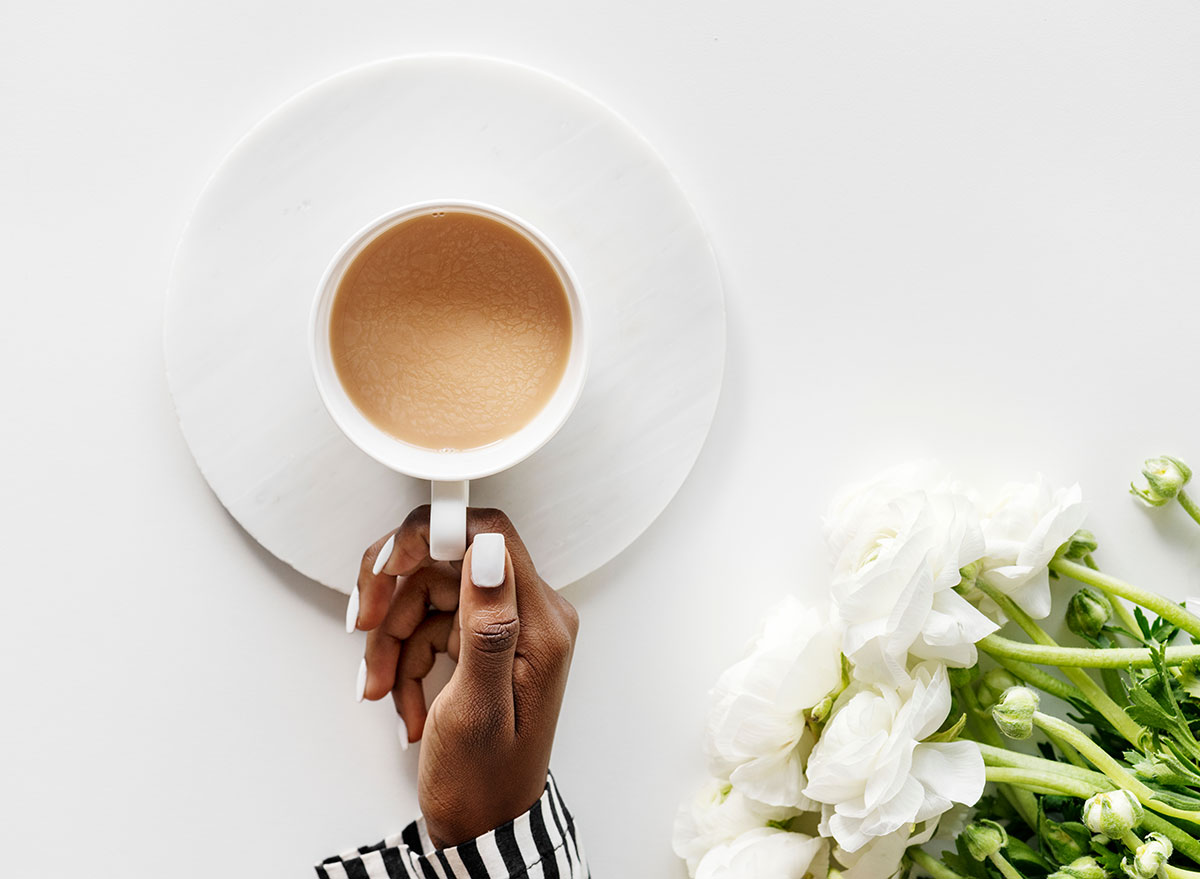
Good news, coffee lovers: Kohlen says your morning cup of coffee could actually be a healthy habit.
"It's been controversial in the past but recent evidence has shown that coffee may be beneficial in reducing risk or severity of cardiovascular disease, diabetes, and some types of liver disease," she explains. "Coffee is a rich source of antioxidants and polyphenols which may contain anti-inflammatory properties. Home-brewed coffee is the best and the less sugar the better."
The only exception, of course, is coffee drinks that are loaded with sugar. So, be mindful of keeping flavored syrups and creamers to a minimum.
Make room for fruits and veggies.
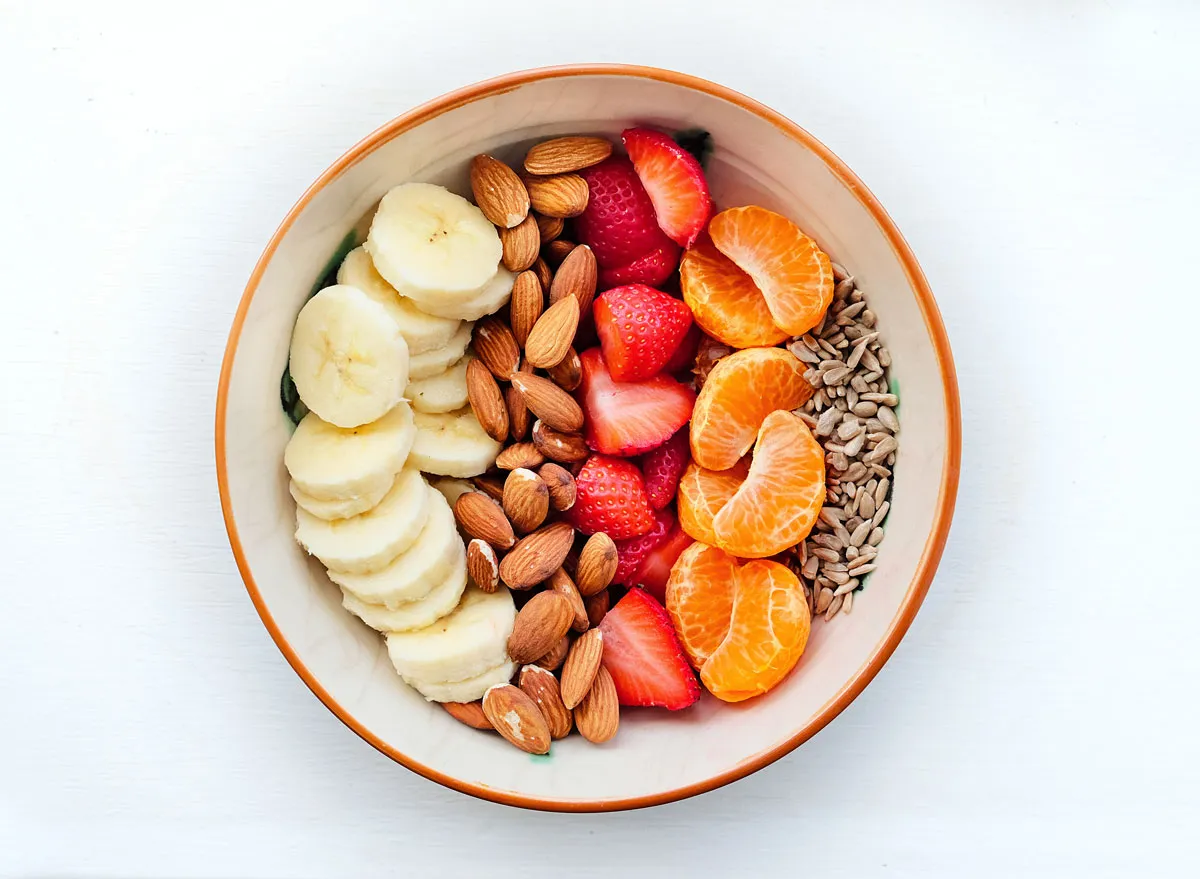
The more colorful your breakfast, the better.
"Fresh or frozen, fruits and vegetables can add so much to your breakfast, both in terms of flavor/texture and nutrient content," explains Gillespie. "They will up the micronutrient and fiber content of your breakfast without adding a significant amount of calories."
Not sure where to start? Try tossing some tomatoes or spinach into an omelet, adding sliced banana to whole-wheat toast with nut butter, or topping your chia pudding bowl with berries.
Meal prep ahead of time.
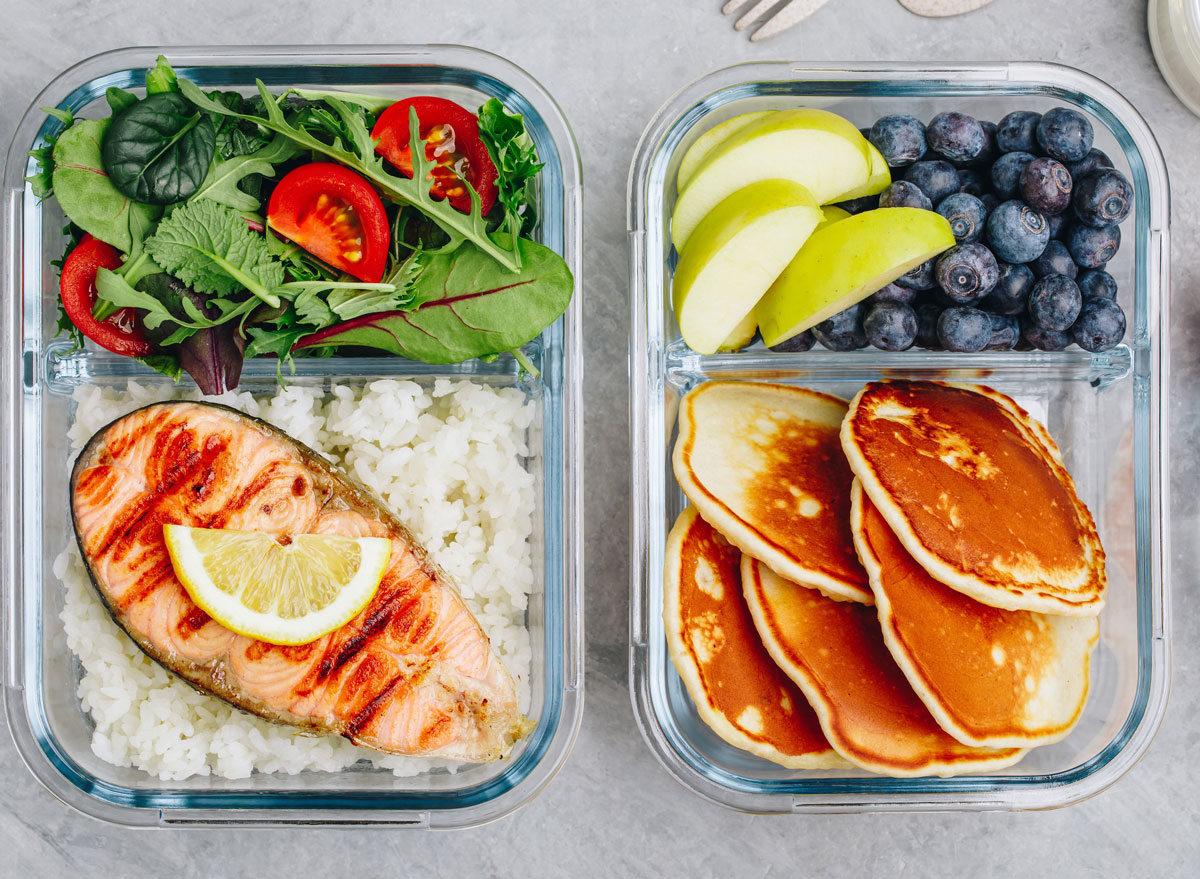
When you're pressed for time in the morning, it can be tempting to just buy a muffin at your local coffee shop or an energy bar from the office vending machine instead of making a proper breakfast. But as you probably know, these aren't typically the healthiest options. So, if you're super busy during the week, Acharya and Gillespie both highly recommend meal prepping ahead of time—such as by making overnight oats you can grab on your way out the door in the morning.
Acharya suggests pre-portioning out individual smoothies into small storage bags and storing them in the freezer. Then, you can simply pop the ingredients in your blender, press a button, and have an instant healthy breakfast in a matter of a minute. Like these 15 Meal Prep Containers You Can Buy for Under $25.
"Mini egg omelets can be made in muffin tins and be kept frozen until you're ready to grab one," adds Kohlen. "Chia pudding can be made in mason jars the night before and topped with fresh berries or nuts for variety. Whole-grain French toast can also be made in bulk and frozen, as well as whole-grain waffles or high-protein pancakes."
Go big.
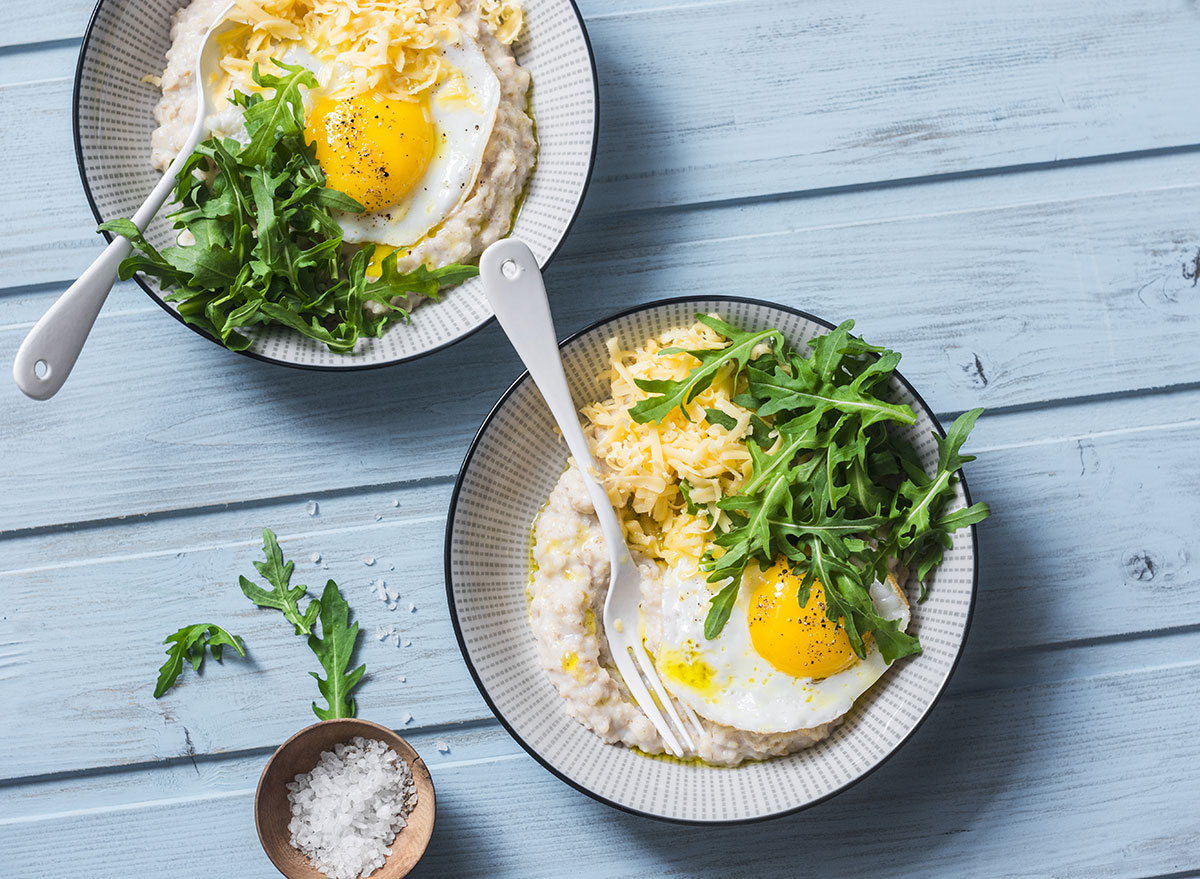
Don't be afraid to make breakfast your biggest meal of the day. In fact, that's one of Kohlen's top tips. As long as the meal is balanced, has plenty of fiber and protein, and is relatively low in sugar, this strategy can actually be advantageous for several reasons.
"We tend to be more insulin sensitive in the mornings compared to the evenings, which means even when we eat a large meal in the morning, our blood glucose doesn't peak as high as it would if we ate this same meal in the evening," she explains. "Additionally, some studies have found it actually takes more calories to burn off a morning meal than an evening meal. Lastly, our bodies are more active during the day so will be using the fuel from that meal accordingly. At night we tend to be more sedentary and that fuel will be channeled directly for later storage (as fat)."
So why not make a big breakfast at home with one of these 91+ Best Healthy Breakfast Recipes.
Get nutty.
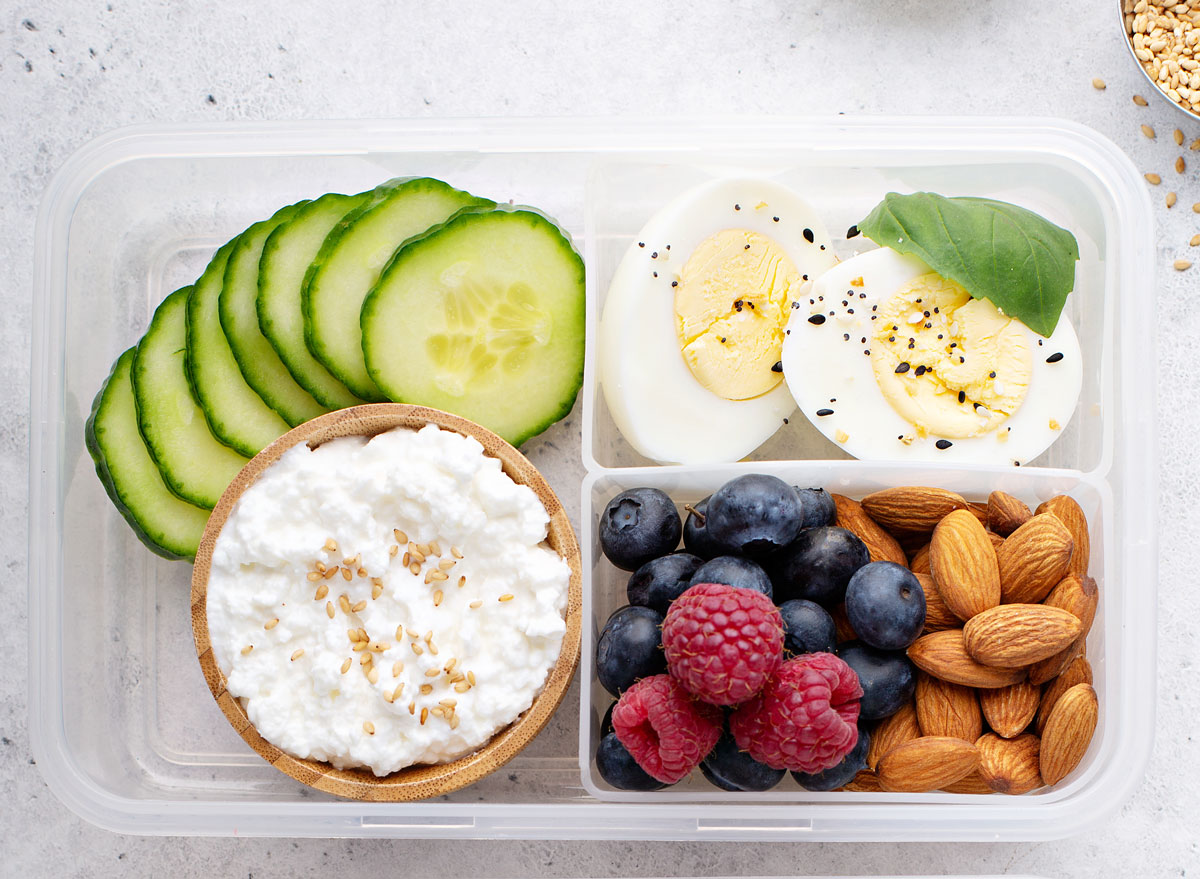
One of the best ways to up the nutritional value of your breakfast is simply by adding nuts into the mix.
"Nuts are a great source of fiber, unsaturated fatty acids, protein, magnesium, potassium, and many more vitamins and minerals," says Kohlen. "Nut butter can be spread on rice cakes, whole-wheat toast, sweet potatoes, apple slices, or can be added to a breakfast smoothie or hot whole-grain cereal. Increasing your intake of nuts just half a portion a day has been associated with lower rates of cardiovascular disease, reduced weight gain, and lower rates of obesity in long-term studies."
If you're not a fan of nuts, or you're just looking to mix it up, registered dietician Alana Kessler notes that seeds are an excellent add-on as well. Like nuts, they're high in heart-healthy omega-3 fatty acids, which are known to have anti-inflammatory properties.
Try nutritional yeast.
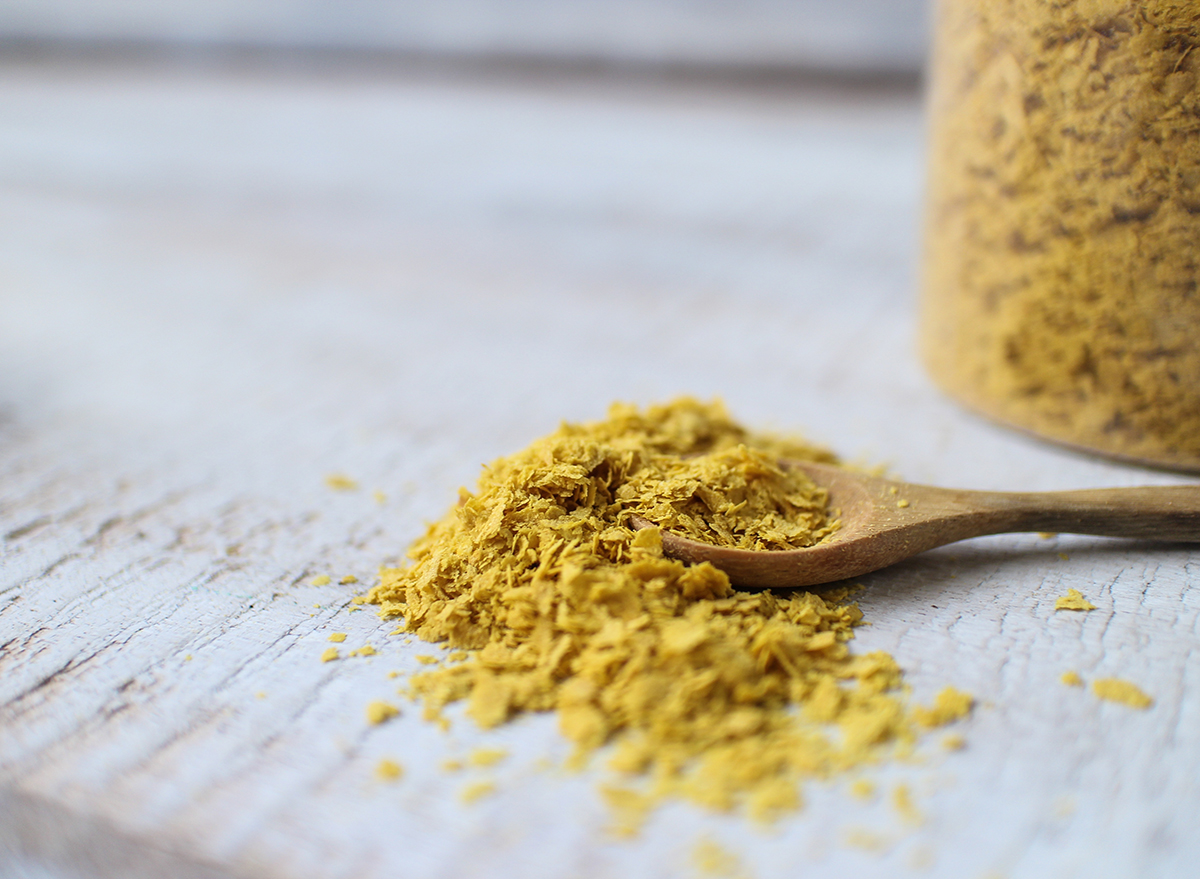
Nutritional yeast—or "nooch" as some affectionately call it—is a go-to ingredient for many vegans. But anyone and everyone can benefit from this super healthy supplement. Since it's known for having a nutty, cheese-like flavor, it's an ideal addition to omelets and egg scrambles, but Kessler also recommends sautéeing vegetables with it.
"Nutritional yeast helps enzymes to absorb nutrients because of the B vitamins it contains," explains Kessler.
Nutritional yeast is considered a complete protein, meaning it contains all nine essential amino acids. However, nutritional values can vary from brand to brand, which is why it's always good to check the label. Fortified products are particularly high in B vitamins, niacin, riboflavin, Fortified products are especially rich in certain minerals, like thiamine, riboflavin, and niacin.
Choose solid foods whenever possible.
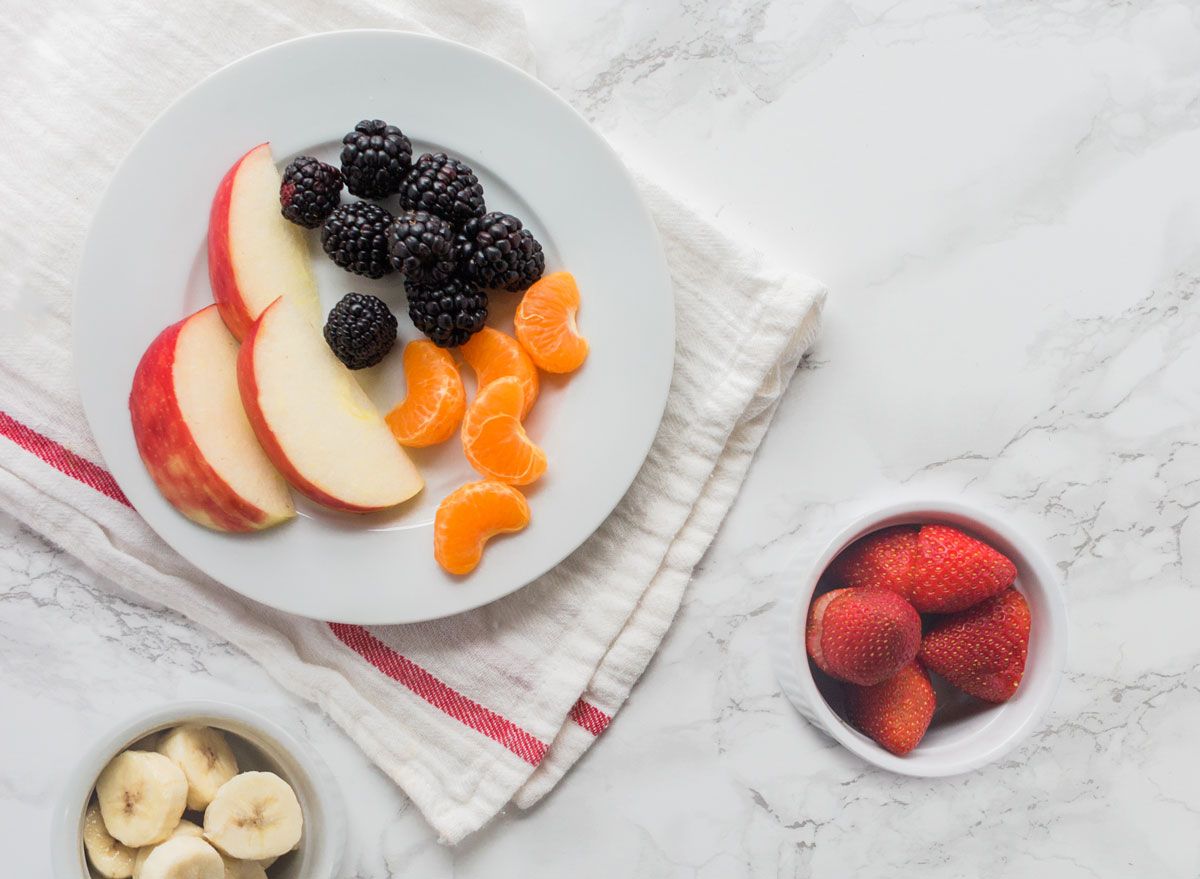
According to Gillespie, solid foods stay with you longer than they do when they're liquified—meaning you're less likely to start mindlessly snacking at your desk between meals. So, rather than guzzling a glass of orange juice, consider eating some orange slices instead.
"Drinkable meals pass through your system more quickly and leave you feeling hungry by mid-morning," she explains.
That said, smoothies can still be a great way to get in a quick dose of protein, healthy fats, fruits, and even vegetables. So if you don't have much of an appetite in the morning, whipping up a drinkable breakfast is certainly better than nothing.
Think high-fiber.
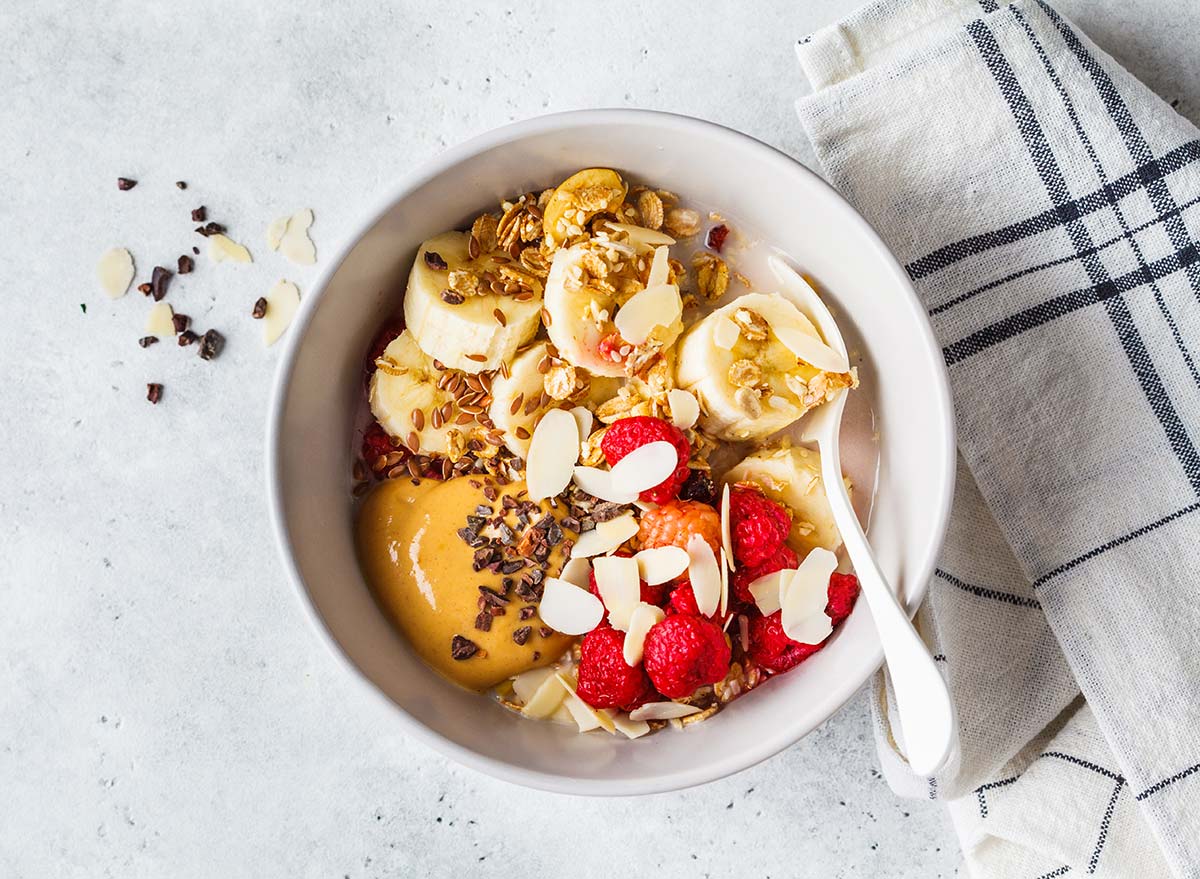
The USDA's recommended daily amount for fiber is 25 grams for women and 38 grams for men up to age 50, and 21 grams for women and 30 grams for men above age 50. Why not get a jump-start on your body's fiber needs at breakfast?
Acharya recommends seeking out fiber-rich foods like oatmeal, avocado, black beans, pears, and raspberries, all of which can keep stomach rumbles at bay all through the morning. Not only are high-fiber foods more satiating, but they can also reduce your risk of heart disease, diabetes, stroke, and colon cancer. The insoluble fiber found in whole grains and veggies can add bulk to your diet, thus helping to keep you regular. Meanwhile, the soluble fiber in oats, beans, nuts, and fruits can help reduce cholesterol and control blood sugar levels.
Need an easy way to increase the fiber content in your breakfast? Grind up some flax seeds and toss them onto your bowl of cereal, yogurt, or oats. Or try one of these 20 Different Ways to Eat 28 Grams of Fiber a Day.
Divide your meal in two.
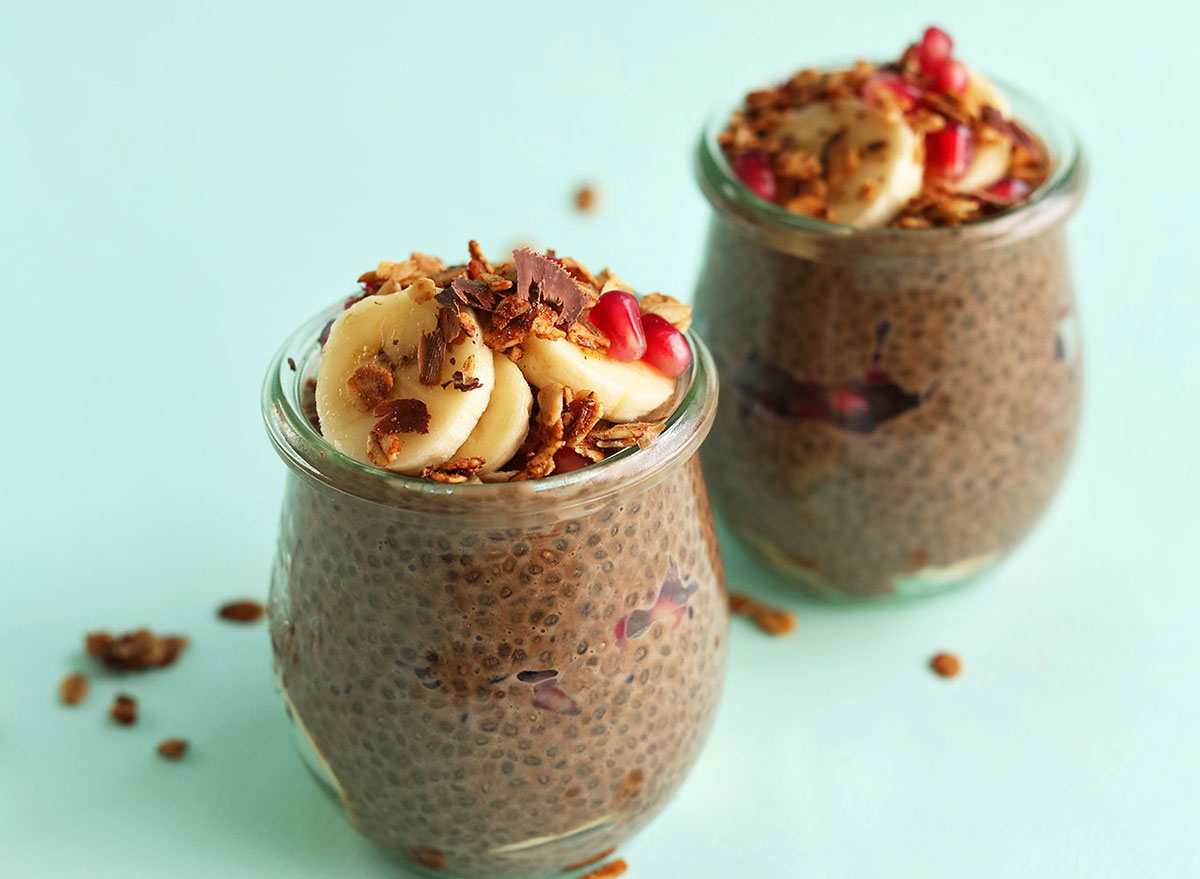
Here's a pro tip from Kessler: Instead of eating your breakfast all in one sitting, consider dividing it up into two mini-portions.
"Splitting meals helps with sustainable energy and hunger management," she explains.
For example, you might drink a smoothie before heading to the office and bring a tofu scramble wrap to eat at your desk. Or, you might have oats with cinnamon after you first wake up, and then nosh on some apple slices with almond butter a couple of hours later. This can be an especially helpful strategy if you don't have a large appetite when you first wake up, or if you don't want to eat a large meal before a morning workout.
Don't fear fat.
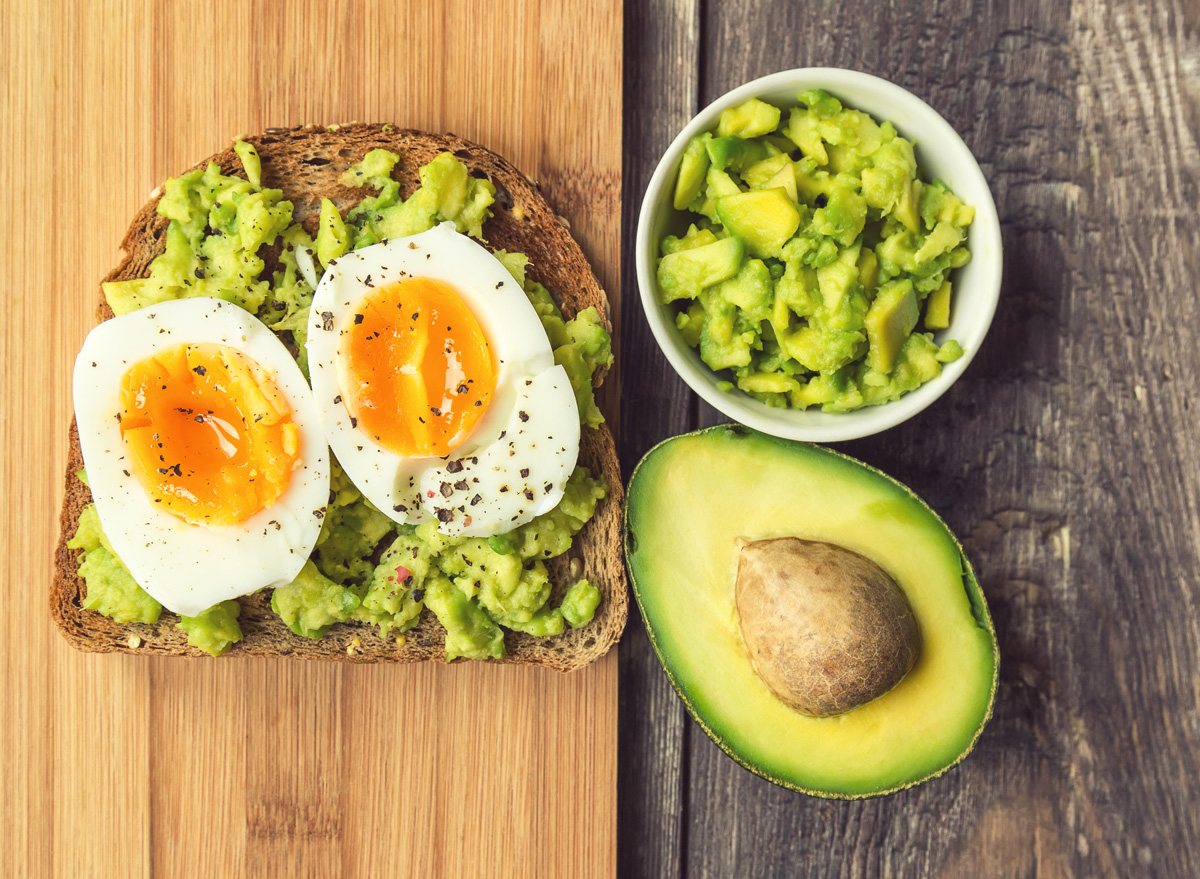
While fat may have a bad rap when it comes to weight loss, Gellman says that it's a key component of a satiating breakfast. Not only are you more likely to burn off the fat you eat at breakfast over the course of the day, but since it digests slowly, it will also help to prevent hunger pangs until lunchtime.
All that said, not all fat sources are created equal. Try to limit your saturated fat intake from foods like bacon and butter, and opt for foods with heart-healthy fats instead — like seeds, nuts, and avocado. Plus, did you know that avocado is the The One Food To Eat To Feel Full, According to a Dietitian?
